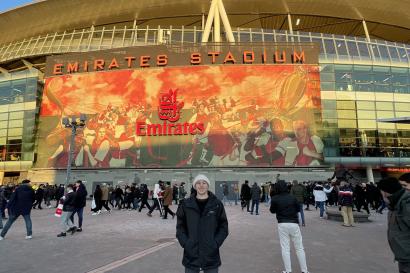It’s final paper writing time here in Nantes, which means we’re collectively discovering that there’s more research to be done in France than that of Muscadet at a vineyard or camembert at a Saturday market. This week, we’re putting the study in “study abroad.”
I’ve dedicated most of my posts to the abroad part of my experience in France, whether that is visiting castles or practicing my French with strangers, but I promise I have an academic life here as well, even if it does look incredibly different from the one I lead in the U.S.
Most of us spend good chunks of our lives at the IES center in the heart of downtown Nantes where we take classes, study in the library, eat lunch, and play instruments. It’s the home to our little community and we feel comfortable there, even if English is prohibited. Based on the biographies of the IES professors found in my student handbook, I think we’d be hard pressed to find better professors than those at IES – many of them hold Ph.Ds. and several teach at other institutions. But our lives aren’t limited to that wonderful safe haven where French is the official language and Americans are abundant.
Several of us took the leap and registered for courses at the local university. I’m taking two courses there: 19th Century French literature and Contemporary History a.k.a. 19th Century French history. I’m starting to wonder if I should drop this whole journalism dig and write a thesis on 19th century France since I’ll probably be an expert by the end of the semester.
Although I wouldn’t say I love my courses at the University of Nantes, I am glad I’ve had the experience of sitting in classrooms with native French speakers. I’ve had the opportunity to learn about the French higher education system, and if anything, it’s made me thankful for my experience in the U.S. I could make a tireless pro/con list in my analysis of my French university experience, but I don’t think that’s a valuable use of my time or my readers’.
As I mentioned in my last post, part of studying abroad is acknowledging the differences between systems and finding the beauty in those differences. For example, while I appreciate how much Northwestern spends to make it’s campus visually appealing, I admire the accessibility – economic and academic – of the University of Nantes.
As registered students at the university, we also have access to university services, which I’ve taken full advantage of in the form of my favorite sport. Each Thursday I hop on the tram in between my classes at IES to play tennis with French students at the university’s gym. I’d never played indoor tennis before, so it was bizarre at first, but it’s been a great experience learning French tennis vocabulary, getting in some exercise and meeting French students.
So, while I’m thankful for the home base that IES has provided us, I’m glad I’ve had the opportunity to break out of my comfort zone and immerse myself even more in the life of the city. I think my time spent at the University of Nantes will be invaluable to my readjustment at Northwestern in just a few weeks.

Katie Nodjimbadem
<p><span style="color: rgb(29, 29, 29); font-family: Arial, Verdana, sans-serif; font-size: 12px; line-height: normal; background-color: rgb(237, 237, 237);">Katie Nodjimbadem is a junior at Northwestern University majoring in journalism and planning to minor in French. She enjoys writing about diversity and culture for North by Northwestern magazine and loves interacting with prospective students as a campus tour guide. Katie bleeds purple and loves to cheer on her fellow wildcats at varsity sporting events. As the daughter of two Francophone parents, she desires to improve her French to better understand her heritage and strengthen her ties with her extended family.</span></p>







